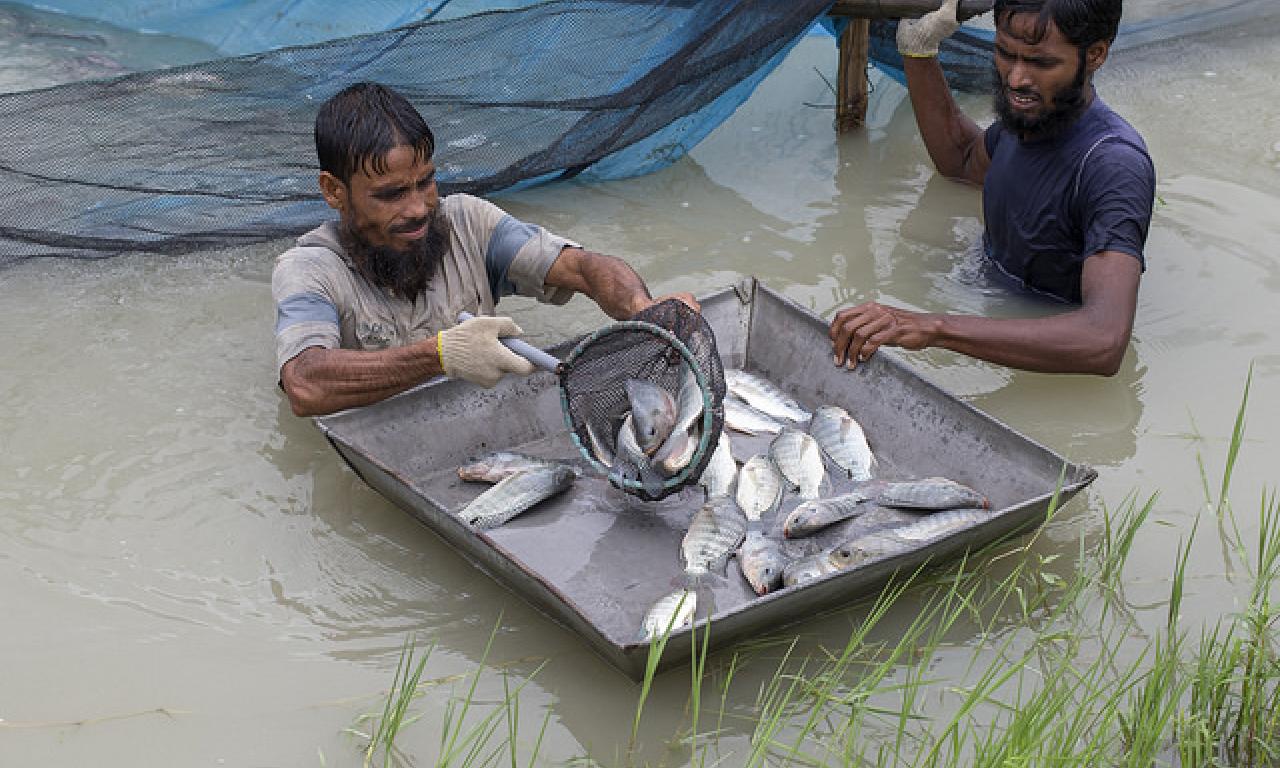
Aquaculture is one of the fastest growing animal-food producing sectors, helping reduce reliance and pressure on wild capture fisheries. However, as global aquaculture production has grown in recent years, aquatic animal diseases have also emerged as a significant challenge.
Recommended publications
- Improving disease resistance of cultured fish through selective programs
- Probiotics and aquaculture
Aquaculture is one of the fastest growing animal-food producing sectors, helping reduce reliance and pressure on wild capture fisheries. However, as global aquaculture production has grown in recent years, aquatic animal diseases have also emerged as a significant challenge. Diseases can severely impact farmed aquatic animals, undermining the sustainability of the aquaculture industry.
The CGIAR Research Program on Livestock and Fish aims to increase the productivity of small-scale livestock and fish systems in sustainable ways, making meat, milk and fish more available and affordable to poor consumers across the developing world.
This blog post is a first in a series that will highlight emerging areas of research led by WorldFish as part of the CGIAR Livestock and Fish research program. This post highlights how WorldFish and its partners are collaborating to tackle emerging diseases in aquatic animals and developing better management practices to minimise their impact.
Tilapia diseases
WorldFish, the Bangladesh Fisheries Research Institute, the International Livestock Research Institute (ILRI) and Merck Lab Singapore are collaborating to fight emerging diseases in tilapia. In Bangladesh and Egypt, mortalities in farmed tilapia are becoming increasingly regular. In Bangladesh, Streptococcus agalactiae biotype 1 has been identified as the main cause of streptococcosis in tilapia farmed in ponds and cages.
The disease is having a major impact on different stages of production, especially the grow-out phase. A cross-sectional epidemiological study is being conducted to quantify economic impacts, identify risk factors and reconfirm the primary etiology. In Egypt, ILRI and WorldFish are undertaking studies to unravel the reasons behind recent tilapia mortalities.
ILRI scientists visited Egypt in September 2015 and undertook rapid epidemiological assessments. They collected field samples to identify mortality risk factors and understand the role of infectious agents. Research findings from these studies will help to develop farm-level interventions and better management practices to minimize the impact of disease in tilapia farming.
Introduction of pathogen-free shrimp in Bangladesh
Penaeus monodon is a major aquaculture species in Bangladesh. The causes for the current low yield rate of 400 kilograms per hectare per year include dependency on wild broodstock, infected postlarvae, and disease and mortality caused by pathogens such as white spot syndrome virus.
Disease is a major constraint for shrimp aquaculture worldwide. Major shrimp-producing countries in the Americas and Asia have developed a protocol to produce specific-pathogen-free (SPF) P. vannamei. SPF shrimp is free of specified pathogens, including 11 viruses, 1 bacterium and 3 parasites. In recent years, Moana Technologies Inc has developed SPF P. monodon.
The MKA Hatchery in Bangladesh has received financial and technical assistance from the United States Agency for International Development (USAID)-funded Aquaculture for Income and Nutrition project and Moana Technologies to produce SPF P. monodon postlarvae at Cox’s Bazar. Successful SPF postlarvae production at MKA Hatchery will allow hatcheries to meet the demand for healthy postlarvae and increase shrimp production in Bangladesh.
Project: Aquaculture for Income and Nutrition
Donor: USAID
Current fish health projects
Project: A Novel Approach for Advancing Prediction and Mitigation of Disease Outbreaks in Aquaculture for Small-Scale Farmers
Donor: Newton Fund
Timeframe: 3 years
Locations: India, Bangladesh, Malawi
Project: Evaluating Costs and Benefits of Prophylactic Health Products and Novel Alternatives on Intensifying Small-Scale Aquaculture Farmers in Asia (IMAQulate)
Donor: Newton Fund
Timeframe: 3 years
Location: India, Bangladesh